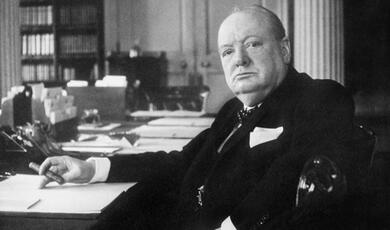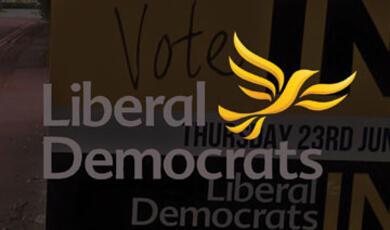Policy making through a public prism
Share
- Details
- Text
- Audio
- Downloads
- Extra Reading
Tony Stoller, Chair of the Joseph Rowntree Foundation and the Joseph Rowntree Housing Trust, considers the relationship between popular discourse and policy-making. Drawing upon recent examples from a wide range of sectors, including adult social care, welfare reform, housing and broadcasting, he will assess the impact of giving undue priority to managing public debate over the task of designing and delivering effective policies.
The event is sponsored by the Joseph Rowntree Foundation.
Download Text
1 November 2012
Policy Making through a Public Prism
Tony Stoller
For a good deal of the past 40 years, I have variously observed, participated in, tried to influence, been impressed by, been appalled by, the way in which public policy has been made in the UK. Over that time, I have noted a significant shift in the relationship between the making of public policy and the way in which public discourse on policy issues is conducted. Over the next 40 minutes, I want to describe the new paradigm which has emerged to replace what we have all understood as the norm for making public policy and hearing public opinion.
We no longer inhabit the age of mere ‘Government by spin’. What we have now is a completely new paradigm for public policy-making, dominated and managed by what we can call the ‘new elite’.[1] It is a coalition of politicians, policy wonks, commentators, journalists and media owners, who both shape and comment upon policy. They are the masters now, and they jointly take part in a symbiotic dance, which the public is encouraged to believe they are part of, but from which they are in reality consciously excluded.
I am going to look first this evening at the way in which that new nexus has emerged; at the consequent new policy paradigms, and the nature of the public interest within that. I will then consider a range of examples from three different sectors to illustrate how this changed way of making public policy has had its effect. Finally, I will suggest a range of ways in which we can help redress the balance, and make the new paradigm better serve the common good.
Let me start with a couple of stories which illustrate the changing relationships between senior politicians and press people over the past 60 years.
The first is told by John Cole, the veteran political correspondent.[2] In the summer of 1948 the then Prime Minister, Clement Attlee, was on his way through Ulster after a holiday in Sligo, in the Irish Republic. These were gentler times. When Attlee arrived at the border, his wife was driving the car. There was no police escort. The biggest danger to the British Prime Minister was from his wife, who had a reputation as an eccentric driver. Smuggling being a major local industry, the customs officials required Mrs Attlee to open the suitcases in her car boot, presumably to ensure that the Prime Minister’s wife was not making a killing out of imported nylon stockings, then in short supply. Cole, at that time a very junior reporter in Belfast, took it upon himself to approach the Prime Minister. Attlee sucked at his pipe,” said in his usual staccato tone: “got y’notebook?”, and proceeded to dictate a statement. And that was that. These were the years when politicians and their advisers made policy, and in general terms the job of the press was to report on that, more or less respectfully.
Fast forward to 1995, and the relationship between politicians and the press was becoming a very different one. Ahead of a pivotal General Election, would be Prime Minister Tony Blair flew to meet the chairman, owner and guiding force of the News International, Rupert Murdoch. Blair and his press guru, Alistair Campbell, regarded the wooing and winning of Murdoch to be the sine qua non of winning a General Election, dominated as they were by their memory of Kelvin Mackenzie’s brilliant demolition of Neil Kinnoch in the Sun in 1992 – the ‘light-bulb’ moment.
This may have marked the high point of the era of ‘Government by spin’, but it was by no means where it all started. When Norman Lamont issued his jibe to John Major, that his was a Government by tomorrow’s headlines, he was reflecting what was the norm for those years. However, because Governments can effectively substitute presentation for policy only when they are doing fairly well, the limitation to this approach became all too evident in the disarray of the post-ERM Major Government, the post Iraq years for Blair, and the troubled premiership of Gordon Brown.
Here at the end of 2012, we can start to see that we are now in a new time. This is well illustrated by the events leading up the Leveson enquiry and the revelations it has produced. I will be speaking more about the significance of Leveson later. For the moment, let us just say that we can now identify the closest of inter-relationships between many media owners and commentators on the one hand, and elected politicians, policymakers and some senior officials on the other, going beyond anything which had been normal practice in the past. Within this ‘new elite’, think tanks have taken over much of the policy-proposing role of the professional civil service, as the latter’s numbers are reduced. That potentially widens the circle of policy-making, and is proving valuable in the devolved administrations in that way, but it also means that a century and a half of civil service expertise is being sidelined. Add to that the extraordinary revolving doors between posts in Government, think-tanks, special advisers, media and regulation, and you have a new paradigm run by a ‘new elite’. How we understand and react to all that is at the heart of my talk this evening.
Now, it would be absurd to suggest – and I do not propose to do so this evening – that newspaper providers or other media magnates have enjoyed power and influence over Governments only in these last 20 years. Lord Northcliffe had the ear of politicians from the early days of the popular press, inspiring Kipling’s famous aphorism about power without responsibility, and the link between Lord Beaverbrook and Churchill during and after the Second World War (and indeed between Beaverbrook and Michael Foot) was almost umbilical. However, it used to be possible to say accurately that the proper relationship between a journalist and politician was that between a dog and a lamp post. The fourth estate was there to hold the third estate to account, not to supplant it. What Tony Blair’s trip to Hayman Island, off the coast of central Queensland, really marked was the start of the emergence of something new. Nowadays, the metaphor for the relationship between journalists and politicians is closer to that at the end of George Orwell’s Animal Farm. The general public, the animals, with noses pressed to the metaphorical glass of the media, look from the farmers to the pigs, the pigs to the farmers, but already it is impossible to tell which is which.
My concern is not simply the modern governments are hugely over-concerned with spin: that’s blindingly obvious. I judge that what is dominant now is a changed paradigm for public policy-making, the process by which it is arrived at, and the process by which the public will is properly discovered and given weight to, so that artificially managed discourse actually takes the place of policy-making.
This distorts how governments manage the accepted need to govern with consent, and confuses how such consent is calibrated. A kind interpretation would be that there is now a new challenge for government to sort out the signal-to-noise ratio in the digital/social media era. A less charitable view would be that it is the role of the ‘new elite’ in creating and managing such noise which is drowning out sound advice and sound debate ahead of proper policy-making. Either we have eroded the capacity of Government to make decisions, or the ‘new elite’ has combined to bring that situation about. Faced with the new politico-media nexus, strong politicians who know what they stand for are less highly regarded than ‘nuanced’ politicians who can tack with this contrived ‘public opinion’ and sell into it.
The changed relationship between those whose job it is to make policy, and those whose nominal role is to report on and criticise it, is undermining our ability as a nation to formulate, properly debate, and then implement public policy. I am not talking about a campaign run by newspaper to press Governments to take, or desist from, one particular course of action. I am talking about the extent to which the framing and management of public discourse has become in too many instances a substitute for proper policy-making; at times a substitute for any policy-making at all.
To validate that concern, I am going to look at a range of examples from different sectors; seek to identify the common threads and their wider applicability; and then suggest how we can manage better this new paradigm and the interface between the expression of the legitimate views of the public and the creation of public policy.
Before I look at the specific examples, however, I want to say a word about the public interest and how it is expressed. The phrase “the public interest” has been much abused for a long time. When I hear a politician speak about it, I tend to rush out to count the spoons. When a newspaper is using it, usually in defence of the printing of the indefensible, I suspect that they have elided the public interest with what interests the public. If that means the buying of newspapers or consuming media, then what we have in the past regarded as genuine public interest is far distant. There is, of course, such a thing as that genuine public interest but the term has become debased. We might be better to think of it in terms of the “common good”, and it is that phrase that I will use this evening.
Let me turn now to three case studies. I am going to begin by looking at the failure of policy development in respect of adult social care in the UK; next, by way of complete contrast, look at digital radio policy here; and then consider the subject dearest to the heart of us at the Joseph Rowntree Foundation, the debate about the nature of poverty in the UK.
The massive and crucial issue of funding of adult social care is a key example. It is absolutely at the heart not just of welfare reform but of the relationship between the state and the individual, and between the generations now and in the future. This one issue can lay bare attitudes about the nature of society and its responsibility to those people within it. The resolution of this has practical as well as symbolic importance. Unless changes are made in the present policies, it is likely that many local authorities are going to find the whole of their annual budget taken up by providing care for older people. That such an untenable position is made ever more likely by the substitution of public discourse for public policy is a matter of the highest concern. The current paralysis in government is an illustration of the way in which members of the ‘new elite’ can combine to generate anxiety and concern, while not taking the brave bold step of resolution.
The development of policy in respect of adult social care is both an old issue and a highly current one, and has been made subordinate to the management of the discourse about this topic for far too long. It has been clear for at least the last three decades that radical policy changes were needed to prevent the public purse being drained by the demands of older people’s needs, even aside from the broadly accepted obligations to disadvantaged adults generally. The Health Advisory Service in 1983 referred to the issue of dementia among the elderly as “a rising tide”. It is now lapping at about chest-high.
This is, of course, a particularly appropriate place in which to talk about the future of long-term care for elderly people. The former Provost of Gresham College, Lord Sutherland, headed the Royal Commission which looked at this issue, in pursuit of a Labour manifesto commitment at the 1997 General Election. That was probably the first opportunity to take a properly and necessarily radical look at this challenging subject, so it is an appropriate point at which to start. It is also an early example of the paralysis of policy-making in the face of managed public discourse. The Sutherland report, thorough and challenging, attracted from within its own ranks a minority report from two members of the commission. The public debate which followed ought to have been a precious part of our process of deliberation. What it became for the Government of the day was an opportunity to do nothing, hiding behind the fact that the Commission was divided.
Stewart Sutherland himself spotted the nexus which ensured that no proper public debate or public policy change was made at that time:
“I knew there was a campaign that had this unholy alliance of special advisers, folks who always took the Treasury outlook – never take on any spending commitment you can avoid – and someone who had also been a journalist.”[3]
Has the new paradigm ever been put more clearly?
I have an unpleasant feeling that at this point you are beginning to smell a whiff of sanctimoniousness. Surely, you are starting to think yourself, if this ‘new elite’ exists, then organisations like the Joseph Rowntree Foundation (JRF) are a part of it? And on that, of course, you are quite right. Indeed, without checking the attendance list for this evening in minute detail, I am prepared to place a small wager – even given Joseph Rowntree’s strictures against gambling – that most of us in this room have somelocus within the ‘new elite’. My point is that, as a consequence, we all carry particular responsibilities for making the new arrangements work better.
What JRF did after the burying of the Sutherland report was to create a Commission on Long-term Care, to which Donald Hirsch contributed significant analytical work in a report which was published in 2005.[4] Similarly, the King’s Fund sponsored a report by Derek Wanless in 2006, in which he balanced all of the potential solutions to the problem, assessed their strengths and weaknesses, and came up with his own solution.[5] These studies were not meant to be an end in themselves. Just as with the Sutherland Commission, the Hirsch and the Wanless reports provided opportunity for genuine public debate, proper policy examination and the formation and implementation of a desperately needed new approach.
However, there was no Governmental initiative until 2008, when it took the form of a six-month engagement process. That told nobody anything that the previous work had not revealed, but was – it seems – an excellent way of avoiding confronting the Treasury on the matter, whilst giving the public impression that something was being done. Following the 2008 engagement process came the 2009 Big Care Debate and eventually a White Paper six weeks before the 2010 General Election. Was this a genuine move forward? No, it was not. The social care White Paper envisaged a National Care Service, but referred any decision on how it should be funded to a new cross-party commission, meaning that implementation was going to be delayed until 2016 at the earliest, even if the Government were returned at the imminent General Election. Once again, management of the public discourse was given priority over dealing with an increasingly pressing public problem.
The intervening period was full of cross party talks, leaked propositions, and the irresponsible election poster campaign about a ‘death tax’. That General Election produced the coalition Government, which in June 2010 committed itself to establishing a Commission on Long-term Care. The Dilnot commission duly reported in 2011, offering a carefully thought-through capped-cost model, fully costed and providing once again a real way forward.[6] The initial public discourse and media commentary around the Dilnot report was excellent. The issue became and remains high on the agenda of those who are concerned for the common good within our society. Sadly, I need hardly tell you the outcome of that. Dilnot’s proposals were publicly praised, but promptly shifted for decision into the next comprehensive spending review.
Meanwhile, the attempts to manage public discourse continued unabated. The then Health Secretary, Andrew Lansley, floated in public his own scheme, which promptly ran straight into the publicity machine of his coalition partners, the Liberal Democrats. At this point the voice of the Treasury begins to be heard more loudly in public, no doubt mirroring its private volume. There is extensive informed briefing in each side’s favourite newspapers suggesting progress – U-turns – the shelving of Dilnot – the reviving of Dilnot – and almost everything in between except for real progress on policy. Eventually, sacked social care Minister Paul Burstow goes public in the press[7] and on BBC Radio 4, to blame the Treasury failing to reform care funding in England, a view promptly rubbished by the Coalition machine.
Who is right? Does it matter? The important point is that once again this now frighteningly urgent public policy matter is being successfully sidelined while public discourse continues to be manipulated.
Where do we stand now? Nearly 30 years after the Health Advisory Service rang the alarm bell; 15 years after Sutherland; six years after Hirsch and Wanless; and a year and a half after Dilnot, we face a minimum of another 2 to 3 years before any conclusions are likely to be reached. Now we read – and note that phrase as, once again, this issue is being played out as managed public discourse, not as proper policy thinking[8] – we read of the Chancellor of the Exchequer “blocking a cap on care for the elderly” in the form of a supposed new Department of Health plan. And now the official Opposition argue that unless a root and branch settlement can be created – and that of course cannot happen until they are in Government – they will give no support to any interim approval of the Dilnot proposals.
Once again, the ‘new elite’, which fuels and then manages public discourse, combines to prevent the development and implementation of public policy. No wonder one hears something approaching despair among those for whom funding care for the elderly is a daily preoccupation. As an example of failure of the process of public policy-making, this could hardly be exceeded.
However, adult social care is far from an isolated example. I want to turn away now from one of JRF’s pre-occupations to one of my own. I cannot resist taking another look at the misfortune which is digital radio policy in the UK. If pretty much all of us are going to be concerned, one way or another, with paying for adult social care, so also pretty much all of us are equally concerned with the wonderful medium of radio. Whatever the march of new technologies and social media, nearly 47 million adults tune in to the radio for an average of over 22 hours each week: a staggering one billion hours of listening.[9]
Radio can also enjoy new, digital technologies. A digital radio transmission system, called Digital Audio Broadcasting (DAB), was developed in the 1980s.[10] The1996 Broadcasting Act legislated for the introduction of digital radio services in the UK. The broadcasters, BBC and commercial, began to offer radio services, but despite all the policy initiatives which then followed, no single killer application emerged for DAB. More than that, new digital technologies were starting to arrive which might very well prove more attractive to the public, and more inclusive in terms of radio broadcasting, than DAB.
By now however, the ‘new elite’ was dominating the development of communications policy in the UK too. This produced an attempt to manage public discourse and implement policy, irrespective of research data or expressed public preferences and behaviour. Government simply announced that it intended to switch off analogue radio in 2015, an outcome intended to help the commercial radio industry rather than benefit the ‘common good’. The communications minister at the time had concluded that “by introducing a hard switch-off date, the radio industry could be reassured that some regulatory relief was on its way”[11].
Now, even if you are one of those who, like me, has made the transition to digital radio listening at home, you are unlikely to wish radio silence on all those tens of millions of non-digital listeners who have not. You may even feel that you would like to go on being able to listen to radio when driving your car, even though the majority of cars cannot be equipped with digital radio sets. For Government policy making on DAB, all this was beside the point. This was about managing public discourse by presenting digital switchover as a fait accompli, merely to satisfy one section of the ‘new elite’ and its commercial interests. And in that one small issue, you may hear echoes of the larger events which have resulted in the Leveson enquiry (which must this evening remain sub judice). Incidentally, three quarters of all the radios sold in Britain these days are still analogue rather than digital.[12]
I have gone into some detail on those two examples, both to illustrate the broader trend and because they are so obviously different, yet exhibit so many common features. I want now to examine one further example, on the topic closest to the heart of all of us at the Joseph Rowntree Foundation: poverty.
It seems almost impossible these days to find valid public debate about the true issues of poverty. The language of ‘benefits’ and the ‘welfare state’ have become ‘dog-whistle’ words of implicit abuse. Politicians assert that housing benefit is designed for “those who lie in bed with the curtains drawn”. Those on benefits are ‘scroungers’, ‘benefits cheats’, and the like. The picture we have of those who are poor is that provided by television programmes like Shameless, reinforced by the patronising toleration of stereotypes by members of audiences in television programmes from Question Time to The Jeremy Kyle show.
The media presentation of ‘facts’ which are nothing of the sort exacerbates the problem. For instance, we all read about, and eventually subliminally come to believe in, the supposed massive problem of teenage girls who get pregnant in order to get themselves local authority housing. This is a modern urban myth, turning up quickly in any related conversation, as it did on Question Time last week. Does independent data substantiate this? It does not. Teenage pregnancies are now at their lowest rate since 1969.[13] Worse, this grossly irresponsible public discourse seems to be suggesting that we should discard any civic responsibility for the children of single teenage mothers, whatever their circumstances. I find that truly shocking.
What about the so-called ‘feckless’ and ‘workshy’, which is how too much of the commentariat seems to enjoy presenting people on benefit. The data shows that 61 per cent of children in poverty actually have working parents (up from 45 per cent in the mid-nineties).[14] To take another example, our analysis indicates that, only in about half of those instances, when somebody manages to get a job does it lift them out of poverty.[15] Yet what we read and what we hear is the stigmatising of what the Victorians used to call the “undeserving poor”. The mooted notion of a two-child policy for families on benefits would amount to introducing a contraceptive function into the benefit system. Is that really what we want our society to be?
Then again, we are led to believe that ‘benefits scroungers’ are represented by families where several generations of unemployment are commonplace, all of whom make a packet out of working the system. In fact there were only 30,000 families with two generations out of work across whole country. And that is surely a matter for shame and alarm about the failure of our economic system, rather than an indictment of those who suffer its consequences.
In this way, public discourse is manipulated so that policy measures which penalise rather than help those in poverty are seen to be going with the grain of that public opinion. The independent British Social Attitudes Survey traces how attitudes to those on benefits have hardened since the end of the 1990s, so that now childless, unemployed adults – the stereotypes at the very front of manipulated public anger about ‘scroungers’ – are the one group which has become persistently worse off over the last 30 years.
To summarise, what we have faced over the past 20 years is a growing move across almost all sectors of public policy to substitute manipulated public discourse for making and implementing effective public policy. This has resulted from the emergence of a ‘new elite’, brought about by a growing interchangeability between successive Governments, their advisers and officials, and the media commentariat, and reflecting a new and immensely powerful media-politico nexus.
If that is the problem, then in what areas do the solutions lie? I suggest there are two broad ways of reversing this trend: returning to the primacy of undistorted data; and providing a genuine opportunity to hear the undistorted views of the much abused ‘general public’.
To look first at the data question, it is really encouraging that the availability of data is so widespread. At the Joseph Rowntree Foundation, for example, we publish the much respected annual Monitoring of Poverty and Social Exclusion, [16] and dozens of detailed, independent studies. We would not for a moment pretend that we are the only player in the field, but we do have the great of advantages of doing, as well as thinking: through the Joseph Rowntree Housing Trust we run social housing and care homes, as well as commissioning independent policy research. The nature of our funding means that we are also free to think for ourselves, not on behalf of any paymasters. But there are many other data-providers, both within and outside government and – not least thanks to the welcome arrival of the Office of National Statistics – almost all of the material data is freely and widely available.
Available it may be, but too much is either misused or not used at all.The worry is not just over-hasty statements by politicians when confronted with events and or issues about which the red top press has become excited, though that is commonplace and troubling. We listened with dismay last year as ministers and media commentators announced causes of the widespread summer riots in England even before the flames had been doused. It is to the Government’s credit that they subsequently released full data about the incident during the riots which have enabled the Guardian, the London School of Economics, the Open Society Foundation and the Joseph Rowntree Foundation to -execute some proper analysis, which may help to inform future public policy.
The concern is also over the partial use of statistics, promoted as part of this managed discourse rather than as grist for genuine debate. All of us here, from our privileged viewpoints, can readily recognise how people with strong political views leap on partial data and behave like barrack-room statisticians. That level of discrimination is not readily available to the public whose views are being manipulated in this way.
Let us turn now to the challenge of giving proper weight to the usually unheard voices of those to whom, or in whose name, public policy is carried out. Pre-eminently, we need to challenge the artful subjectivity of too much supposed ‘news’ reporting. In addition, we need to recognise the risks inherent in ‘hash-tag politics’. As an ardent participant in the Twittersphere, I can see that it has plenty of advantages (@tonystoller, if you’d like to follow me) but it is wide open to manipulation and the consequent misrepresentation of what most people actually think. Social media offers an important way of engaging in dialogue, but do we really value 140 characters from any self-appointed commentator on, say, welfare reform above the considered views of those who live and breathe the issues – whether as recipients or intellectuals?
The risk is that the social media and the traditional media can manufacture an ersatz public opinion in huge volume. As a consequence, the capacity of any Government to make a conventional response to the expression of public view is circumscribed, or more probably misdirected. The combination of the 24 hour news cycle and digital and social media, means that it has arguably never been easier to manipulate the public debate. This can lead to spurious outcomes which suggest that the ‘public interest’ is one thing – in line with what those elements of the ‘new elite’ want to be the case – when actually people at large might conclude something quite different if they were allowed for a moment to stop and think for themselves.
What actions can we here this evening undertake to manage the new policy-making paradigm for the common good? First, we must return to policy-making properly based upon valid data; insist that that data is effectively open source, available un-packaged by opinion to those who wish to participate in the debate; and ensure that we are informed by those voices that are usually unheard.
At JRF we have just launched an initiative to be the catalyst for a comprehensive anti-poverty strategy for the UK. We are setting out to explore the root causes of poverty and the different available ways of responding to it, and to correct two key dysfunctions: the high level of general ignorance about what ‘social care’ really is; and the alarming propensity for taking short-term decisions rather than taking the long-term view. We hope to confront political stereotyping, which blames poverty either on the individual or structural inequality, confuses welfare with poverty, and fails to make the basic connections which underpin a true appreciation of the common good.[17] We are determined that this will be conducted according to the best principles, based on valid independent data and taking full account of genuine public views - and to provide credible solutions too. It is our opportunity to use our presence within the ‘new elite’, not only to work towards a necessary public policy process but also to demonstrate by the way in which we believe such undertakings should operate.
The second task for all of us is to prevent the Leveson report, and the action which should follow from it, being undermined by the very processes which it has exposed. You hardly need a PhD in media studies to recognise the growing rubbishing in newspapers and on Twitter of what Leveson is presumed to be going to say, and the growing backsliding among politicians about taking any real action when the time comes. Those of us who like to think that we comprise responsible civil society need to come together in defence of a proper hearing for Leveson, and a proper policy outcome, whatever that may be.
Third, we need to be alert to the growing trend to let go the impartiality requirements on broadcasters. We hear increasingly the notion that because there are so many broadcast channels in this digital age, there is no need to hold the major ones to political impartiality, including in their news. That is a dangerous and subversive fiction. It leads to the spectre of UK versions of Fox News and CNBC grinning at each other across the waste land of the long tradition of decent broadcast news in the UK, as they now do in the US. There is even some managed public discourse that European Human Rights legislation will require us to permit political advertising on television and radio. That need not be not so. The Government quite easily got a specific exemption at the time of the last communications legislation, and can do so again. But both Government and regulator need to be kept up to the mark, and not allowed to be led astray by the self-interest of the ‘new elite’.
And last, we need to help the public as a whole to understand social media, to appreciate its strengths and weaknesses; to know what represents a genuine view ‘trending’, and what has been artificially set up to appear as such; to realise that there are those around who regularly offer to sell us another hundred or thousand followers. The social media could be about a genuine upwelling of public opinion, but they are open to manipulation as never before. The 2003 Communications Act gave Ofcom a statutory duty to promote media literacy.[18] Now, post-Twitter, is the time to deliver.
Can we do all this? It is far from easy, not least as any such efforts are themselves vulnerable to the distortion of managed public discourse. But we simply must. The steady failure of so much public policy-making over recent years leaves us no option other than to confront the new paradigm, identify the working of the ‘new elite’ and find a new and valid way to design and implement effective policy, not just talk about it. It is time for things to get better, and this is where we have to start.
© Tony Stoller 2012
[1]a phrase advanced by Christopher Lasch in his book on the Revolt of the Elites. W W Norton 1995
[2]John Cole As it Seemed to Me (1996) London Pheonix p 11
[3]Guardian 25 February 2009
[4]Donald Hirsch (2005) Facing the cost of long term care York: Joseph Rowntree Foundation, www.jrf.org.uk
[5]www.kingsfund.org.uk/projects/wanless-social-care-review
[6]www.dilnotcommission.dh.gov.uk/our-report/
[7]Daily Telegraph, 20 September 2012
[8]Daily Telegraph 2 October 2012
[9]RAJAR, quarter ending June 2012
[10]Tony Stoller (2010) Sounds of Your Life, the history of Independent radio in the UK New Barnet, John Libbey Publishing, p272-292
[11]Foresight, Fudge or Facilitation? The Making of UK Digitial Radio Policy 1987-2008, Tony Stoller, in Radio and Society, New Thinking for an Old Medium, Matt Mollgard (ed.) Cambridge Scholars, Newcastle-upon-Tyne, 2012 p163
[12]Economist 15 September 2012
[13]http://www.ons.gov.uk/ons/rel/vsob1/conception-statistics--england-and-wales/2010/2010-conceptions-statistical-bulletin.html
[14]DWP Households Below Average Income statistics 1994/5-2010/11, published 14 June 2012
[15]http://www.jrf.org.uk/blog/2012/10/work-best-route-out-poverty
[16] http://www.jrf.org.uk/publications/monitoring-poverty-2011
[17]See Julia Unwin’s blog at www.jrf.org.uk/blog/2012/10/party-conferences
[18]Communications Act 2003 s.11
This event was on Thu, 01 Nov 2012
Support Gresham
Gresham College has offered an outstanding education to the public free of charge for over 400 years. Today, Gresham College plays an important role in fostering a love of learning and a greater understanding of ourselves and the world around us. Your donation will help to widen our reach and to broaden our audience, allowing more people to benefit from a high-quality education from some of the brightest minds.


 Login
Login











